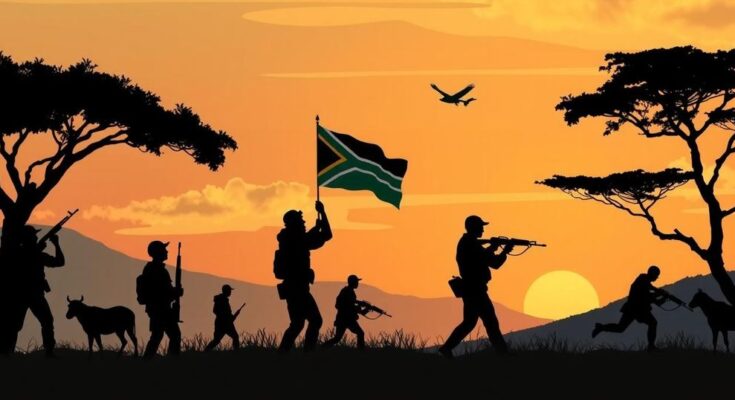The remains of 42 South African freedom fighters who died in exile in Zimbabwe and Zambia during the anti-apartheid struggle were repatriated to South Africa. Their arrival at Waterkloof Air Force Base was part of a government initiative to provide closure to families. Notable figures, including Duma Nokwe, Florence Mophosho, and Basil February, were among those returned. A ceremony led by President Cyril Ramaphosa is scheduled for Friday to honor their legacy.
The remains of 42 South African freedom fighters, who passed away while in exile in Zimbabwe and Zambia during the anti-apartheid struggle, were returned to South Africa on Wednesday. These remains were officially received by government representatives and family members at the Waterkloof Air Force Base in Pretoria, following their exhumation in the aforementioned countries for reburial in South Africa. This initiative is part of a broader government effort aimed at providing closure for families whose loved ones died far from home while participating in the underground activities of the African National Congress (ANC) and the Pan Africanist Congress (PAC). Before the dismantling of the apartheid regime in 1994, numerous activists fled South Africa to pursue military training in neighboring nations, intending to return and lead an armed resistance. Many others escaped to avoid arrest by the apartheid government due to their involvement in anti-apartheid actions, particularly in Zimbabwe and Zambia, where underground organizations were considerably potent. Following its ban in South Africa, the ANC, led by Nelson Mandela, relocated its headquarters to Lusaka, Zambia, where many of its members met their demise and were subsequently buried. Among those whose remains were repatriated are notable figures from the freedom struggle, including Duma Nokwe, Florence Mophosho, and Basil February. During a Heritage Day celebration in South Africa on Tuesday, Deputy President Paul Mashatile remarked that this repatriation program is part of efforts to educate future generations about the sacrifices made by many in the struggle against apartheid. He stated, “As a national memory project, this initiative aims to commemorate, celebrate, educate, promote, preserve, conserve, and provide a durable testament to South Africa’s road to freedom.” President Cyril Ramaphosa is set to preside over a homecoming ceremony for the repatriated remains on Friday, wherein they will be handed over to their families for burial across the nation. Furthermore, the government announced ongoing efforts to repatriate additional remains of South African citizens from countries such as Lesotho, Ethiopia, Tanzania, Angola, and Russia. Deputy Defense Minister Bantu Holomisa expressed hope that this initiative would allow for the return of more individuals who died in challenging circumstances, thus reconnecting them with their families.
The repatriation of remains of freedom fighters is a significant undertaking reflecting South Africa’s efforts to reconcile with its past and honor those who fought against apartheid. Many activists were forced into exile during the oppressive regime, with a substantial number receiving military training abroad and engaging in anti-apartheid operations from neighboring countries, including Zambia and Zimbabwe. After the end of apartheid in 1994, the South African government initiated programs to repatriate the remains of those who died in exile, allowing their families to lay them to rest in their homeland. This initiative is part of a larger effort to acknowledge the contributions of these individuals and educate the public about the history of the struggle for freedom in South Africa.
The arrival of the remains of 42 South African freedom fighters from Zimbabwe and Zambia marks a poignant moment in the nation’s history, underscoring the sacrifices made during the fight against apartheid. The government’s initiative not only recognizes the contributions of these individuals but also aims to bring closure to their families by reuniting them with their loved ones. The ongoing efforts to repatriate additional remains from other countries further emphasize South Africa’s commitment to honoring its history and educating future generations on the struggle for freedom.
Original Source: www.usnews.com




